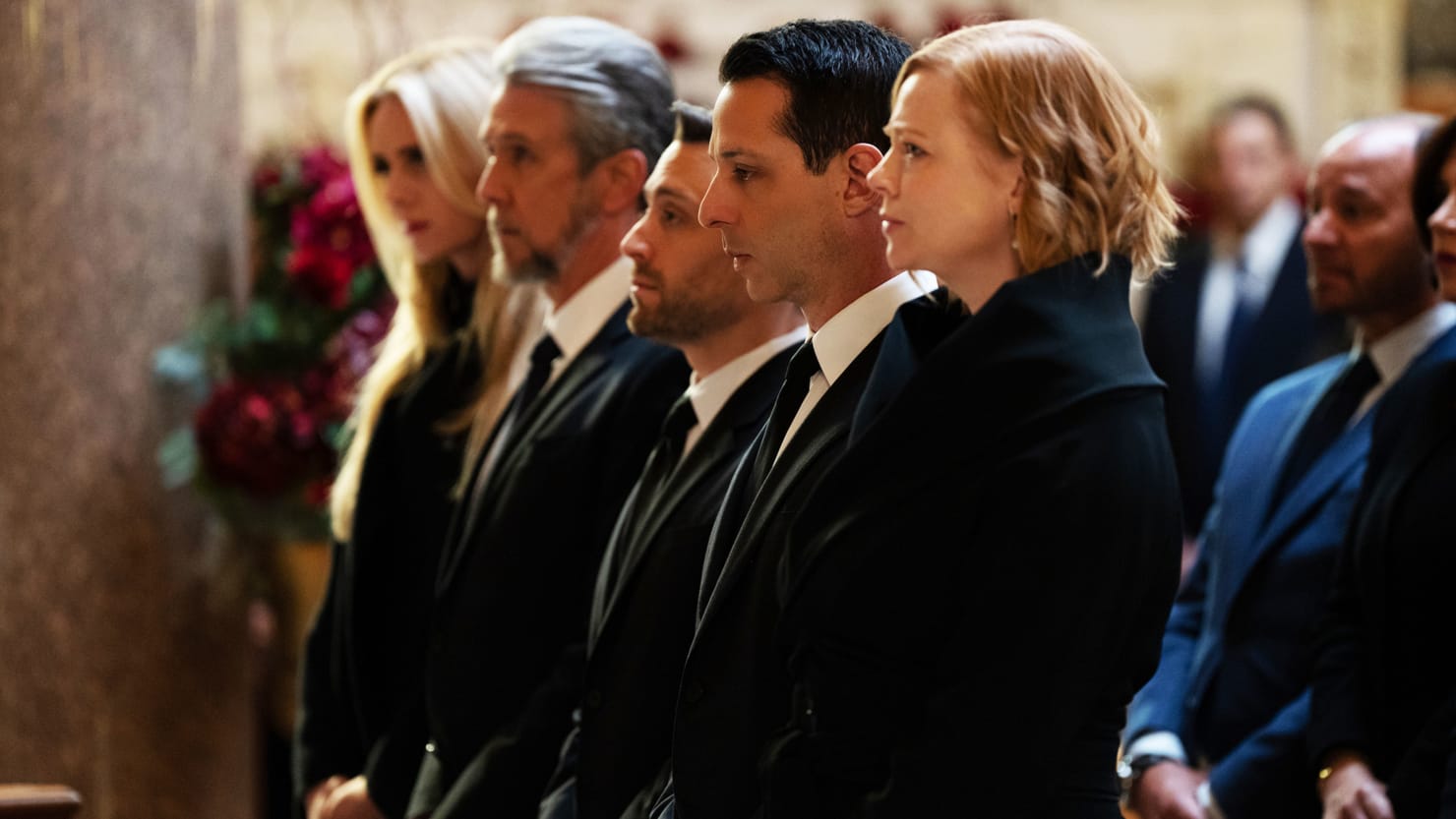Prior to the beginning of its final season, HBO’s Succession was lauded as the latest in a long line of iconic television shows, spearheading the new generation of TV’s golden era. It was looked at as a natural successor—if you will—to other sublime shows of the last two-plus decades (The Sopranos, The Wire, and Breaking Bad, among others).
Like other great shows, Succession eclipses the realm of a regular drama, where a focus on action-based plots take a backseat to epic dialogue, emotional turmoil, and the sad absurdity of the human condition. It’s more of a Greek tragedy or a Shakespeare play than its drama contemporaries, camouflaged by the struggle for a successor in a media empire. For every classic plot twist or suspenseful moment you might see in a show like Lost or M*A*S*H*, there are 10 several-minute monologues that use words like “corpuscles” and “geysers.”
A commonality in all of these shows is also elite writing. We root for murderous hit men, DEA agents and Donald Trump Jr.-inspired nepo babies, not because we like them but because good writing makes us feel things and sympathize with these characters on a flawed, human level. As it turns out, dramatic lifestyles provide a wonderful canvas for telling the story of life as we know it, on a level that makes sense and resonates with us.
If this season of Succession began with murmurs that it could be on a similar level to our favorite legendary TV programs, the first nine episodes have done nothing but lend credence to the idea that it belongs in the rafters. Each episode has been a triumph of its own, an emotional journey followed by a week of discussion from theater lovers and internet-obsessed teenage fangirls online. There are just as many think pieces on blogs as there are TikTok edits of Frank and Karl set to sped-up SoundCloud rap.
It’s easy to get a sense that something special is happening. Twitter becomes a glorified Succession forum in the effervescent afterglow of each new episode, full of as many good takes as impressively bad ones. If you’re wondering why conversation around the show has become so ubiquitous, just look at master stroke episodes like “Connor’s Wedding,” “America Decides,” or the penultimate “Church and State.” It’s easy to see how this show has become irresistibly fun to talk about and sends shockwaves of discourse across the internet.
The final episode is set to air this Sunday—a board meeting for the ages between Kendall and Shiv that will likely determine the fate of the family dynamics, their company as a whole, and the country at large. It’s slated for 90 minutes and could be the show’s magnum opus, an epic swan song to catapult the series into the number one spot. So what exactly does Succession have to do to meet—or exceed—the great shows that preceded it? Is it even a possibility?
First and foremost, it depends on the viewer’s perspective as to what makes a show great. Each great show had its unique moments. Aside from a common focus on the human experience, different aspects made each legendary show so memorable. The Sopranos was especially great—and held in such high esteem—because of the barriers it broke down: A new take on the already popularized “mob movie,” a story about a mafia boss grappling with masculinity, depression, love, and morality. The inherent artfulness and exploration of the human condition furthered the anti-hero narrative in popular art, and basically everything great shows have done since 2000 have been somewhat indebted to The Sopranos.
The Wire was a groundbreaking exposé on corruption, a raw chronicle that blurred the lines of morality between police and criminals, breaking down gender roles and stereotypes for heroes and villains alike. The profundity behind villains like Stringer Bell and Omar Little compared to the shallow disposition of cops like Jimmy McNulty provided a framework for conflict in television never before explored and often duplicated (albeit not as well) in years that followed.
Breaking Bad capitalized on the emotional side of the futile War on Drugs, a three-decade-old issue constantly tearing away at America’s moral fabric. The show premiered in 2008, a year to the day before Barack Obama’s inauguration, a president who emptily promised to end the drug epidemic, a tragedy that only became worse under an administration whose hands were tied by connections to the drug industry. Meanwhile, Breaking Bad became a beacon of the times, emblematic of the advancement of drug addiction and dealing in America, exemplifying the idea that even the most conventional suburban families can be ravaged by systemic failures.
Succession is groundbreaking in its own right, with its fly-on-the-wall handheld camera style and an enhanced focus on theatrics and blocking that makes the show look more like big-budget cinema than a network TV show, but its real success lies in taking aspects from its predecessors and improving upon them. It has the familial turmoil of The Sopranos, but arguably better acting. It has the corruption of The Wire without the implication that cops (or media tycoons, in this instance) can actually be good people. It takes cues from Breaking Bad in terms of prescient social commentary, but life imitates the trials and tribulations of Waystar Royco more than it ever did Walter White and Jesse Pinkman. We are living in the dying embers of American capitalism and this show displays all too well its associated perils.
The act of taking existing ideas and improving upon them is essential to good art, but because of the perceived lack of “innovation”, there’s a real chance that critics will never rank it above shows that were seen as more revolutionary for their time. That’s unfair to Succession, though, because you don’t have to pioneer a genre to be the best at it.
Mad Men is another show that now feels criminally underrated, likely because creator Matthew Weiner took cues from The Sopranos’ writing style and dramatic structure from his time on set, but did it just as well or better. But you’ll almost never hear anyone argue that it’s better than The Sopranos.
From an objective perspective of quality, Succession is on par with the greats, and the creators have a chance to make a statement for the ages with the final episode. Everyone is watching. The body of work for every show as a whole should be weighed with equal importance, but that’s not the reality. Series finales have an outsized impact on public perception. The Game of Thrones final season—and in particular its series finale—were so poorly received that sometimes we forget that during its run it was mentioned in the same breath as all of the shows in this piece.
Conversely, the world has been quick to forget that Breaking Bad was a show of middling popularity until its last season, when it catapulted to legend status and furthered its permanence with “Felina,” possibly the best finale of all-time (and certainly the best anagram episode title of all-time). Even The Sopranos cemented its hall-of-fame run with its iconic “Made in America” finale. The cut-to-black, ambiguous ending is the most divisive TV moment of all time, but all questions about its effectiveness are quelled by the simple fact that it’s still talked about in relation to every other television finale in existence—an episode that changed the way showrunners have approached finales since.
For Succession to truly become the best show of its era, its ending shouldn’t be one based on shock value, because that is never how the show operated. While shows like Breaking Bad dropped jaws with its finale, Succession needs to take an approach more akin to The Sopranos or Mad Men in terms of ambiguity. It’s always been a show that makes you think, makes you laugh, and makes you cry, a show that grapples with the stark realities of life and asks you to internalize and interpret every situation in your own way. Every Succession fan seems to have a unique affinity for a different character and unbridled vitriol for another.
This show was never going to give us a finale that ties every loose end and shows us a clear, clean-cut successor. It was never Logan Roy’s plan, and it was never the Succession showrunners’ plan either. What most likely will—and definitely should—happen is a more enigmatic, obscured moment that helps us understand what the future holds for the Roy family.
It’s ultimately a tale that’s never over. We are going to have to create our own ending for Succession, and I wouldn’t have it any other way. After all, it’s been established that each episode in this season is one successive day (Logan died in episode three and his funeral wasn’t until episode nine—six days later), so it’s unlikely we will get a definitive conclusion on the same day as a future-shifting board meeting. We might get a strong hint at a successor, and one may actually be named, but to think that closes the final chapter of this family is absurd—the siblings’ story will stretch well beyond the confines of the show.
Truthfully, Succession has already exceeded the mark for its final season. Already lauded as a great show, Season 4 has undoubtedly been its most riveting season yet. It should be tough for them to not stick the landing. The only things that could leave a sour taste are an unexpected, shocking plot twist (like the currently popular theory that Cousin Greg is the ultimate successor) or a slapstick, Parks and Recreation-like ending that fast forwards 30 years ahead—please no dystopian future where a computer-aged Kendall Roy is the CEO of some metaverse tech company.
Ultimately, we know what lies ahead. The future isn’t fully written, but we can be sure it’s bleak, sad, and hopeless, for society and the Roy family alike, no matter how rich and powerful they end up. To complete their journey to the exalted rank of all-time television shows, creator Jesse Armstrong and the writers just have to do what they’ve been doing throughout the entirety of Succession.
They’ve already done the hard part in getting us to the finish line. And after four years of compelling television, they’ve earned our trust.






